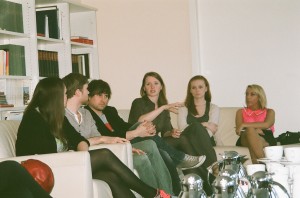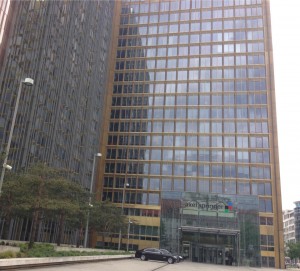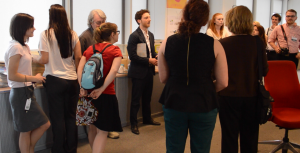by Marina Weis
Everyone thought journalist Axel Springer was crazy when he built his publishing house on the west side of Berlin during World War II.
A few days later, the Berlin wall was built right beside it.
But Springer had faith that Germany would be reunited and his headquarters would be in the center of a unified Germany. He believed his company had to pursue something called corporate social responsibility, with his fellow journalists fighting for a free social market. He called the headquarters that towered over the wall the lighthouse of freedom.
Although the Berlin Wall no longer stands near the headquarters today, the company still towers as the leading publishing house in the country, owning more than 230 newspapers and magazines with more than 80 online offerings, as well as involvement in television and radio stations and activity in 44 countries, according to its website. Its tabloid, Bild, has the highest circulation among Europe’s newspapers with more than 12 million people reading it daily.
Axel Springer, the journalist, may be gone, but current leaders of the company say his entrepreneurial spirit, creativity and integrity are carried through in every aspect of the company, even in the contracts of each journalist.
“Everything that he said came true and is still valuable today,” said Leeor Englander, assistant to the editor-in-chief of Die Welt, a large national newspaper owned by Axel Springer. “They were fighting against communism before and now it is terror today.”
Because Springer focused not only on content, but also on distribution and production, stemming from his family’s background in the newspaper business, he built the first print houses in Germany, and Axel Springer AG therefore began to print other newspapers, creating joint ventures, which began the expansion.
“At the time when Axel Springer invented Bild Zeitung, it was comparable with Facebook,” Englander said. “He did something nobody ever did before … The way he invented new magazines was the same way people today invent new apps and websites.”
In the same way that Springer fostered technological innovations, the company now strives to be the leading digital media company in Germany. Axel Springer AG currently generates more than a third of its revenue from its international business and with digital media.
Englander boasts of Die Welt as the first newspaper to have color, pictures, a compact version, a mobile application and to be the first real German national newspaper to go online.
“Journalism has nothing to do with paper,” Englander said. “It’s how do we reach our readers. We are not trying to keep print alive – We are trying to keep it as long as we can.”
Subscription only covers half the production cost of Die Welt. Advertising and classifieds cover the rest. Years ago, the reader paid almost all of it.
Despite ranking third among other leading print publications in Germany, Die Welt has taken leaps to further its digital presence, adopting a philosophy of mass-market journalism, which focuses on reaching all target groups with new products. It now sells more digital subscriptions per month than print.
“We knew that people were willing to pay for digital content,” Englander said. “Online is the most important distribution channel for the future.”
The focus was so much so online that Die Welt just last year decided to produce its content for online first, and then, at the end of the day, take the best content that was already online and publish it in print.
For comparison, Englander said Volkswagen builds the same car for both Germany and United States, but it looks only a little bit different because marketing is different in the United States. He said in the same breath, Die Welt produces the same content for its compact version, but it’s just less and shorter.
This repurposing of content in order to reach different readers can be seen Axel Springer’s publications. For example, the science section in the compact version of Die Welt was recently renamed Internet news to attract younger readers.

Axel Springer Academy students explain what they’re learning to the Point Park students and faculty.
(photo by Helen Fallon)
In order to ease into the switch from old economy print style to a multimedia company, Axel Springer AG created a journalism academy to act as a change agent or think tank, bringing “fresh blood” and a “new mindset” to the company, according to Rudolf Porsche, director of Axel Springer’s Akademie.
The Akademie started in 2007 and is the most progressive journalism school in Germany, according to Porsche. About 1,000 students apply to the fast and aggressive two-year vocational training at Axel Springer, but only about 40 of them are accepted. The job offers come after completion and some can be rejected. Most have completed an academic degree and prior journalism experience. They are also given a monthly salary of about 1,200 euros. These students are then contracted to work for three years at Die Welt or any other Axel Springer AG affiliates after the Akademie.
Porsche, also a journalist, said Akademie students are given “all they need,” such as Mac books, smart phones and cameras, as well as teachers to tell them how to use the equipment. The last thing they are given is the “freedom to act.”
“We give you the equipment, we teach you the techniques, and you teach us what to do with this,” Porsche said. “That is why we are awarded with prizes because it is not my work. It is the creativity of our students.”
In the past, the Akademie was awarded the Grimme Online Award, the CeBIT AppStar and the European Newspaper Award for projects when it competed with other news organizations in Germany.
“We do not compete with other schools. That’s boring. We competed with other brands,” Porsche said.
The students – this year ranging in age from 18 (which is unusual, Porsche said) to early 30s – are currently working on a relatively secret masterpiece project for the next few weeks that will eventually be published in the Welt Kompact and Welt Online.
“We started with simple things – with news, the basics, but now we are doing TV journalism and multimedia journalism,” said an Akademie student about her experiences at Axel Springer. “I think that’s really important. That will be the future. I think it’s great we learn it here even though it is hard work all the time, and you have to get yourself into all this technical stuff.”

